BMW i4 VS Toyota Prius
BMW i4
The BMW i4 beautifully merges the dynamism of a saloon with the efficiency of an electric vehicle, offering a truly exhilarating driving experience. Its design seamlessly blends elegance and athleticism, highlighting BMW's dedication to both aesthetics and performance. Inside, the i4 boasts a high-tech cockpit that harmonises luxury with intuitive technology, allowing drivers to stay connected while on the move.
more informationToyota Prius
The Toyota Prius stands as a pioneer in the realm of hybrid vehicles, offering an eco-friendly driving alternative with its innovative technology. Its aerodynamic design and comfortable interior make it a practical choice for those looking to reduce their carbon footprint without sacrificing style. Additionally, the Prius boasts a reputation for reliability and efficiency, contributing to its lasting popularity among environmentally conscious drivers.
more information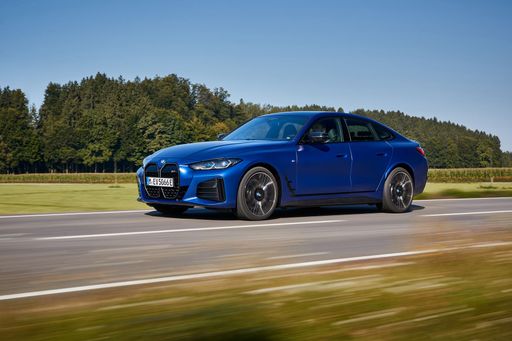 @ press.bmwgroup.com
@ press.bmwgroup.com
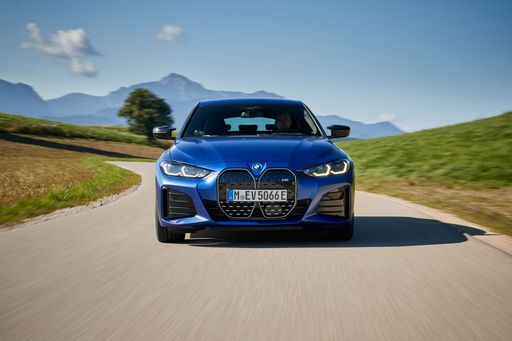 @ press.bmwgroup.com
@ press.bmwgroup.com
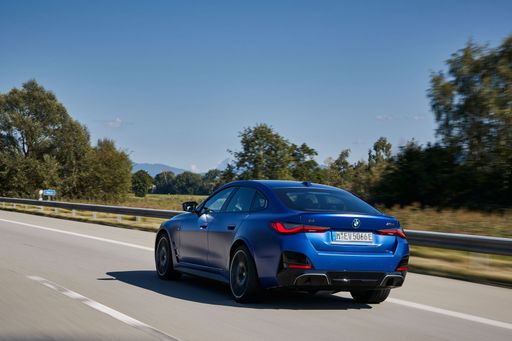 @ press.bmwgroup.com
@ press.bmwgroup.com
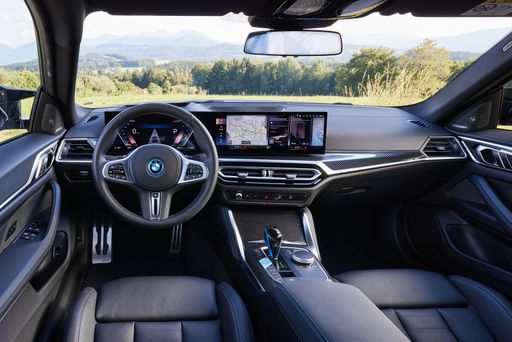 @ press.bmwgroup.com
@ press.bmwgroup.com
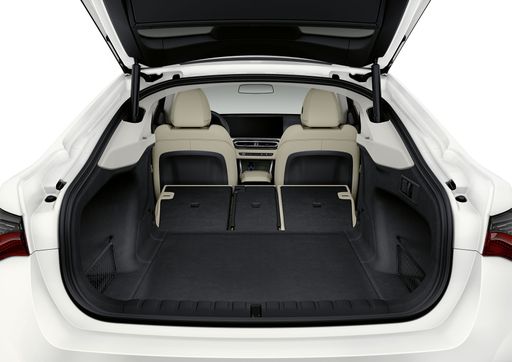 @ press.bmwgroup.com
@ press.bmwgroup.com
 @ Toyota
@ Toyota
 @ Toyota
@ Toyota
 @ Toyota
@ Toyota
 @ Toyota
@ Toyota
Costs and Consumption |
|
|---|---|
|
Price
about 53200 - 66600
$
|
Price
about 42500 - 49400
$
|
|
Consumption L/100km
-
|
Consumption L/100km
0.5 - 0.7
L
|
|
Consumption kWh/100km
15.6 - 18
kWh
|
Consumption kWh/100km
-
|
|
Electric Range
485 - 582
km
|
Electric Range
72 - 86
km
|
|
Battery Capacity
67.1 - 81.3
kWh
|
Battery Capacity
-
|
|
co2
0
g/km
|
co2
12 - 17
g/km
|
|
Fuel tank capacity
-
|
Fuel tank capacity
40
L
|
Dimensions and Body |
|
|
Body Type
Hatchback
|
Body Type
Hatchback
|
|
Seats
5
|
Seats
5
|
|
Doors
5
|
Doors
5
|
|
Curb weight
2075 - 2290
kg
|
Curb weight
1620 - 1630
kg
|
|
Trunk capacity
470
L
|
Trunk capacity
284
L
|
|
Length
4783
mm
|
Length
4599
mm
|
|
Width
1852
mm
|
Width
1782
mm
|
|
Height
1448
mm
|
Height
1470
mm
|
|
Payload
445 - 480
kg
|
Payload
365 - 375
kg
|
Engine and Performance |
|
|
Engine Type
Electric
|
Engine Type
Plugin Hybrid
|
|
Transmission
Automatic
|
Transmission
Automatic
|
|
Transmission Detail
Reduction Gearbox
|
Transmission Detail
CVT
|
|
Drive Type
Rear-Wheel Drive, All-Wheel Drive
|
Drive Type
Front-Wheel Drive
|
|
Power HP
286 - 544
HP
|
Power HP
223
HP
|
|
Acceleration 0-100km/h
3.9 - 6
s
|
Acceleration 0-100km/h
6.8
s
|
|
Max Speed
190 - 225
km/h
|
Max Speed
177
km/h
|
|
Torque
400 - 795
Nm
|
Torque
-
|
|
Number of Cylinders
-
|
Number of Cylinders
4
|
|
Power kW
210 - 400
kW
|
Power kW
164
kW
|
|
Engine capacity
-
|
Engine capacity
1998
cm3
|
|
Top speed
190 - 225
km/h
|
Top speed
177
km/h
|
General |
|
|
Model Year
2024
|
Model Year
2023
|
|
CO2 Efficiency Class
A
|
CO2 Efficiency Class
B
|
|
Brand
BMW
|
Brand
Toyota
|
BMW i4
Exploring the Future: The BMW i4
In the ever-evolving landscape of electric vehicles, BMW has stepped forward with its state-of-the-art BMW i4. This model combines luxury, performance, and sustainability, reflecting the brand's commitment to innovation and excellence. Let's dive into the technical details and the innovative features that make the BMW i4 a noteworthy entry in the electric vehicle market.
Power and Performance Unleashed
Under the sleek bonnet of the BMW i4 lies a powerful electric motor, offering a range of performance options from 286 to an exhilarating 544 PS. With a 0 to 100 km/h acceleration time spanning between 3.9 and 6 seconds, the i4 provides a driving experience that matches its sporty exterior. The advanced powertrains offered include rear-wheel drive as well as all-wheel drive options, catering to different driving preferences.
Energy Efficiency Meets Long Range
The BMW i4 stands out not only for its performance but also for its impressive efficiency and range. The electric vehicle boasts a consumption rate ranging from 15.6 to 18 kWh per 100 km, complemented by an electrical range between 485 and 582 km. Such figures are achieved through BMW's innovative engineering and the generous 67.1 to 81.3 kWh battery capacity.
Innovation and Technology at the Core
BMW has infused advanced technology throughout the i4 to enhance both comfort and connectivity. The vehicle features state-of-the-art integration with the BMW iDrive system, providing seamless control and access to driving data, entertainment, and navigation. Furthermore, the i4 is fitted with cutting-edge driver assistance features, making every journey safer and more enjoyable.
Design and Functionality: The Perfect Balance
The aesthetically pleasing design of the BMW i4 is equally matched by its functional interior. With a 470-litre boot and the ability to comfortably seat up to five passengers, the vehicle balances practicality with style. The streamlined body measuring 4783 mm in length, 1852 mm in width, and 1448 mm in height, ensures that head-turning aesthetics are accompanied by aerodynamic efficiency.
Sustainability in Motion
Beyond performance and elegance, the BMW i4 is a testament to the brand's commitment to sustainability. As a zero-emission vehicle with a CO2 output of 0 g/km, it aligns with the global shift towards environmentally friendly transportation solutions. Furthermore, its efficient energy consumption underscores its effectiveness as a leader in electric vehicle innovation.
Conclusion: The BMW i4 – A Visionary Road Ahead
The BMW i4 is more than just an electric car; it is a sophisticated blend of cutting-edge technology, impressive range, and unparalleled performance. With its CO2 efficiency class rating of A and top-tier driving dynamics, the i4 is set to redefine the standards for electric vehicles in the luxury segment. Whether for a daily commute or a longer journey, the BMW i4 promises an exceptional driving experience while paving the way for a sustainable future.
Toyota Prius
The All-New Toyota Prius: Revolutionising Efficiency and Performance
The Toyota Prius, a name synonymous with hybrid innovation, has once again shown why it remains at the forefront of eco-friendly automotive technology. The latest models have enhanced technical features and innovations, setting new standards for efficiency and driving experience.
Hybrid Performance: A Leap Forward
The latest Prius models employ a sophisticated 2.0 litre Plug-in Hybrid system that flawlessly melds petrol and electric power. With a power output of 223 PS, it propels the Prius with impressive dynamism, reaching 0-100 km/h in just 6.8 seconds. This performance-oriented aspect of the Prius does not compromise on efficiency, with an astonishing fuel consumption ranging from 0.5 to 0.7 L/100km.
Electric Range and Efficiency
One of the key highlights of the new Prius is its substantial electric-only range. Depending on the variant, it can travel between 72 to 86 km on electric power alone, making it an ideal choice for urban commutes where zero emissions are preferred. The hybrid system's CO2 emissions are remarkably low, between 12 and 17 g/km, contributing to its CO2 Efficiency Class B rating.
Engineering Excellence with CVT
The Prius is equipped with a state-of-the-art Continuously Variable Transmission (CVT), ensuring a smooth and efficient drive. This advanced transmission supports the front-wheel-drive layout, delivering power seamlessly and enhancing driving pleasure without sacrificing fuel economy.
Stylish Design and Comfort
Designed as a sleek five-door hatchback, the Prius offers a comfortable and spacious interior with seating for five passengers. It measures 4599 mm in length, 1782 mm in width, and 1470 mm in height, offering a practical balance of size and comfort. The boot space, while tailored for the hybrid battery, still provides a decent 284 litres of storage.
Cost Efficiency
The running costs of the Prius are competitive, with monthly expenses estimated between €1064 and €1188, and cost per kilometre ranging from 42.6 to 47.5 cents. Its efficient design results in a maximum speed of 177 km/h and a practical fuel tank size of 40 litres, ensuring less frequent stops on longer journeys.
Conclusion: The Prius Legacy Continues
The Toyota Prius continues to lead by example in the realm of hybrid technology. Combining impressive power with unmatched efficiency and a sophisticated driving experience, it is clear that the Prius remains a compelling choice for the environmentally conscious driver. Its innovative features and favourable cost metrics only bolster its appeal in the modern automotive landscape.
